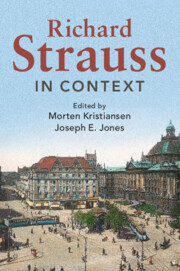Book contents
- Richard Strauss in Context
- Composers in Context
- Richard Strauss in Context
- Copyright page
- Contents
- Figures
- Notes on Contributors
- Preface
- Note on Translation
- Part I Family, Friends, and Collaborators
- Part II Career Stations
- Part III Cultural Engagement and Musical Life
- Part IV Professional and Musical Contexts
- Part V In History
- Chapter 25 Modernism
- Chapter 26 Traditionalism
- Chapter 27 World War I
- Chapter 28 Nazi Germany
- Chapter 29 Lateness
- Chapter 30 Reception
- Part VI Artifacts and Legacy
- Further Reading
- Appendix: Letters Bibliography
- Index
Chapter 28 - Nazi Germany
from Part V - In History
Published online by Cambridge University Press: 08 October 2020
- Richard Strauss in Context
- Composers in Context
- Richard Strauss in Context
- Copyright page
- Contents
- Figures
- Notes on Contributors
- Preface
- Note on Translation
- Part I Family, Friends, and Collaborators
- Part II Career Stations
- Part III Cultural Engagement and Musical Life
- Part IV Professional and Musical Contexts
- Part V In History
- Chapter 25 Modernism
- Chapter 26 Traditionalism
- Chapter 27 World War I
- Chapter 28 Nazi Germany
- Chapter 29 Lateness
- Chapter 30 Reception
- Part VI Artifacts and Legacy
- Further Reading
- Appendix: Letters Bibliography
- Index
Summary
This chapter charts the ways in which the Nazi regime sought to reshape the musical environment in Germany in response to the turbulent political and economic situation in the early 1930s when unemployment amongst musicians was at an all time high and the future of various hallowed institutions such as the Berlin Philharmonic was very much in doubt. The Nazi promise to devise an administrative framework of guilds designed to regulate the activities of musicians deemed acceptable to the regime initially attracted support from politically unaffiliated leading musicians such as Richard Strauss, who seized the opportunity to promote long-cherished ideas that would enhance the performing rights and firm up copyright laws for composers. For its part, the Nazi regime scored a huge propaganda coup in persuading Strauss to become the first President of the Reichsmusikkammer in November 1933. But the relationship between composer and the authorities soon foundered after Strauss refused to subsume his creative autonomy to the current political demands that outlawed creative collaboration with Jews.
- Type
- Chapter
- Information
- Richard Strauss in Context , pp. 256 - 265Publisher: Cambridge University PressPrint publication year: 2020

